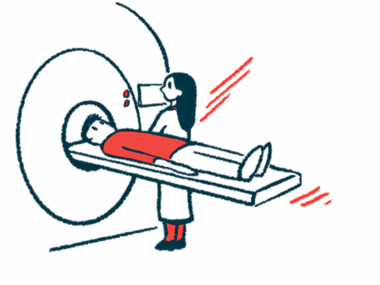What happened during my least enjoyable MRI experience
After a series of calm sessions, my near-panic somehow returned
Written by |

Before I received my relapsing-remitting multiple sclerosis (MS) diagnosis in 2016, I underwent a standard MRI exam, with and without contrast, that scanned my brain, thorax, and cervical spine. I’d never had an MRI before this one. I was vaguely familiar with what the machine looked like, but it’s safe to say that I didn’t know what to expect.
Because of my MS-related brain fog and poor memory, I can’t recall much of how my first MRI went or how I felt during it. I do remember it taking about three hours, which I didn’t enjoy because I had to remain still the entire time. That was the biggest issue for me because I get antsy extremely quickly, especially when I’m unable to move. I also remember my mom taking me out to breakfast as a reward when the scans were over; that was the most enjoyable part of that day.
Since being diagnosed, I’ve had to get one to two MRIs each year, and over time, I’ve become used to them, even somewhat numb during them. I think that’s because, regardless of whether I want to undergo an MRI, I have to do it; there’s simply no way around it if I’m to monitor my brain lesions. Thus, I’ve realized and accepted that I’ll have to get MRIs for the rest of my life. Or at least, I thought I’d accepted this reality.
The return of unwelcome sensations
Over the years, I’ve managed to stay as calm as possible during my MRIs, both mentally and physically, and I’ve been grateful for that. But that wasn’t the case a few days ago, when I had my routine checkup and annual MRI, my first since starting Kesimpta (ofatumumab) in September.
During this most recent MRI, my body and mind were not at all calm. Before the exam started, the technician set me up with a brain and neck cage over my head, as well as headphones to play calming R&B, cushions around my head to minimize movement, and an emergency squeeze ball in case I had to signal for help.
Everything was fine for a little while. I was enjoying the music, and I attempted to fall asleep. I’m not sure how much time had passed because time doesn’t seem real when I’m in the machine.
But eventually my heart began to beat a little faster, a sense of unease settled in my stomach, my breathing became a bit heavier, and warmth spread through my body. My mind also began racing, and I thought about how I’ll have to be in this machine once or twice a year for the rest of my life. I was starting to panic, and my eyes filled with tears. It was my least enjoyable MRI thus far, and a total surprise.
I tried to slow down my breathing and regain control of my increased heart rate, but it felt almost impossible. I took some deep breaths while remaining as still as possible, and I began to think about happy thoughts, such as going to dinner that day with my partner. I felt my body start to cool down, and I began to doze off.
As soon as I dozed off, the technician pulled me out of the machine to inject the contrast in my arm through an IV. She told me that the longest part of the exam was over and that I had about 15 minutes left. I felt relieved because I just wanted to go home.
When the MRI was over, the technician informed me that she’d made an error with one of the scans and that I’d need to return the next day to complete the exam. My heart sank, but I wasn’t upset or frustrated, because mistakes happen and we’re all human beings doing the best we can. Unfortunately, the same near-panic came up during that follow-up MRI! Thank goodness I was again able to bring myself to a more relaxed place.
I just hope that the next time I have an MRI, I’m able to somehow begin it with calm and, if not, keep the panic at bay.
How do you remain calm during routine MRIs? Please let me know in the comments below.
Note: Multiple Sclerosis News Today is strictly a news and information website about the disease. It does not provide medical advice, diagnosis, or treatment. This content is not intended to be a substitute for professional medical advice, diagnosis, or treatment. Always seek the advice of your physician or other qualified health provider with any questions you may have regarding a medical condition. Never disregard professional medical advice or delay in seeking it because of something you have read on this website. The opinions expressed in this column are not those of Multiple Sclerosis News Today or its parent company, Bionews, and are intended to spark discussion about issues pertaining to multiple sclerosis.




Debbie Bond
Im claustrophobic so I dread MRI s. My doctor gives me Ativan to take just before I lay down. It helps to keep me from panicking inside the tube. I wouldn’t get through it otherwise. Hope this helps
David Borromley
Something that helped me enormously was not so much what I did but what the MRI operator did. She explained, as usual that it would take around 20 minutes but this time said that it’s done in sort of cycles each one lasting around 5 minutes. She then told me , through the headphones, when each 5 minute was up. After the second 5 minutes I found myself thinking ‘OK, that’s halfway’ and similarly after the third cycle I was thinking ‘oh that’s okay , just another 5 minutes’. Somehow breaking it down into 5 minute sections made it much easier and time seemed to pass much faster. Without those 5 minute sections and reminders, and like you, I seem to feel that it’s all a never ending period of tension and rising anxiety
Maria Koutromanos
I too have RRMS and when I go for my MRI scans I close my eyes have the ear muffs on ( still can hear the drumming ) in order not to get into a panic I close my eyes before I go in when I’m in there is normally a mirror with a picture reflecting off wall but I keep eyes closed. The contrast always makes me nauses and having the urge to swallow continuously . Just a bit of info all my medication stopped working and recently had a stem cell transplant .
Rosanne Costain
I used to volunteer for drug studies (until I aged out) and the best study I ever did was having an angiogram. This opened up the carotid arteries on my right side and after about 2 months I stopped slurring my words, the brain fog was gone and my balance improved (I went from always using my walker to my cane, with the walker for longer distances. It isn't a cure, but it did help me as well as a few others I still have numbness in my hands and feet, but less than before the procedure. No cure yet and I have hopes for the younger people that are have been recently and yet to be diagnosed. Good luck to everyone.
Larry Williams
Went for a MRI for aortic aneurysm and was given the contrast after divulging my allergic reaction to penicillin and my type 2 diabetes, all along with MS .
About eight hour later, I fell to the floor and lost ability to walk on my own. I am now using a walker to assist.
No one will admit that the contrast caused this, only that this was a flare up from my MS.
I walked in on my own and left there disabled
Cathy H.
You are a brave soul! I have to be put to sleep completely. I used to break out in to a sweat just being in the room with it. My neurologist has been very patient over the years
Linda Coleman
You know after reading your experience I have been diagnosed with RRMS I have been living with it for 27 years and this year was the first time EVER that they did a mri on my spine and whatever else is back there that they wanted an MRI for but usually I LOVE MRI's I pass out cold and sleep through it but this year was to me a horror. First it took them 6 hrs in 1 day. And they had to keep Scolding me to stop moving. It was getting really HOT on the table the surface of the table. After a while I had to squeeze that ball because I felt that my flesh was burning. I lifted up the jonnie coat that you wear and sure enough on my back where it was burning it was like I had gotten a bad "sunburn" specifically in the areas that were so painful to me. I told them that I was not a complainer or winer and for the most part I can handle "SOME" pain but when things get too much and after so many hours and them saying to please lay still I felt I was going to lose it. But my point was the fact that out of all the years I have had MRI's yearly this was the first time that they ever did my back all the way to my butt or farther I don't know I didn't stick around to ask questions I just wanted out of there. I wonder if this is some kind of new protocol or something. I haven't had another one this year YET but I was wondering if anyone could let me know if this is a new protocol? Just a broad question to anyone that could clue me in. Please and thank you.
Joel Shearon
One time I had all three, brain, cervical, and thorax all at once. The MRI machine got so hot that it felt like it was burning my back. Now I only do two one day and one the next.
I also had my doctor prescribed something to calm me for the MRI. It is a pill that I only take for this.
Mary
In the days before botox and interstim ,I had a bad experience with a radiology technician. He didn’t let me out of the MRI when I asked to come out due to severe bladder spasms. I actually was crying during the rest of the MRI. After that I started asking the techs to tell me how long each scan would take. I used that knowledge to focus on counting down to when I could adjust my body (not head). It makes me feel in control and helps me relax.
Lynette Carroll
wash cloth over eyes. I can't see how little room there is in that machine. Also helps with calmness and even sleep.
Bram Platel
Thanks for writing this @Desiree.
I have been in so many MRI-scanners that lost count. It must be close to twenty times. And it is still quite uncomfortable (these machines seem not to have been developed for people with rather large heads/noses).
I am a biomedical engineer, and during my studies I learned a lot about how MRI-scanners work. Why they make the noise that they do and why this damned cage around your head is so tight. Thinking about the scientific marvels of the machine helps me (nerd :) ) stay calm.
I even made a video (In Dutch, but with English subtitles) to explain this all to other patients: https://youtu.be/7u6Ts0P-r6s?si=lT3_-SuOFtfsBHgW
Still it kinda sucks... Like many things with MS do... Fortunately I agreed with the neurologist that the standard use of a contrast agent is not needed...
Sandy Nickel
It’s hard to have an MRI and be calm about it. (Retired nurse here). A few suggestions. Make sure you pee first. Ease up on the fluids ahead of time so as not to be bothered by a full bladder. Never open your eyes. 👀. I close them as soon as I lay down. I do not watch the cage going over. I keep them closed. So do not open your eyes. I actually do not like music playing. Too much stimulation. I deep breathe, I listen to the scanner’s sounds and even am amused at them. There is no sounds like them in the real world. I listen for patterns and play along in my head. 😉. I turn it into “my alone time” in my head. Just me and the machine and an occasional voice giving me an update. I know that little squeeze button is my out if I need it. Most importantly, I pray. I’m Catholic and I pray the Rosary counting on my fingers, or do a Divine Chaplet praying for a good outcome. Now I have to get abdominal ones too! I have a pancreatic cyst we are monitoring. Now that’s an interesting MRI! Can’t relax in that one, it’s intense.
The other thing that I’ve helped patients with, is a script for one dose of Ativan, a small dose before the MRI.
Way to go hero for calming yourself down. You can do this. Also welcome to the K club. It’ll be 5 years for me this September. No new lesions at all. I have my pain and stiffness but I can still run after my grandkids. All good things are wished for you.
Robert W Amidon
atavan
Helen Bolding
Desiree, just had my yearly MRI yesterday, Wednesday in Australia. I find a Valium an hour beforehand tends to keep me calm and I sleep through a lot of it. All the best & keep well. I’m also on Kesimpta. Helen.
Michelle McDonald
When I saw the title for this article, I had to read it. I was diagnosed with MS over 14 yrs ago, and I thought I had MRIs "down". I've received more than I can count and have fallen asleep in my "bunk" in the machine. I haven't been receiving contrast for awhile, so that wasn't it. But during the last session a couple of weeks ago, and the last scanning piece of the session, I was tensed so tightly to prevent my twitching and I had so much shooting pain throughout my body that I really don't want to receive another MRI. I know that the holes in my brain and C-spine are only getting worse but I'm "good" according to the doctors, since no new lesion can be found.
Maggie C Groening
I sing the score of The Sound of Music in my head, in order. I am surprised and grateful when the procedure ends before I get to Edelweiss.
Deborah Lynn Gostin
I would say my first MRI was the worst because I didn't know what to expect. But I can hardly remember it now since it's been so long. But I do remember it was the laying still though, because I also have back and neck disc issues that cause me frustration when I can't move.
Still, they've become so routine now that I know what to expect each time, except for one time when the contrast was administered. The person who put the needle in my arm did a poor job and it hurt very badly during the rest of the MRI and it left a painful bruise. that was the first and only time something like that happened.
My next MRI has just been scheduled and, for the first time ever, no contrast is being ordered. My neurologist explained it was because I'm rather stable at this point and it's not recommended, she said, because of that. I have another question in to her asking what the possible consequences of having the contrast dye in our systems are, because I had once read something about it not being good for us. If anyone here knows, I'd be interested in learning what others do know!
Lauren Rogers
I drink a really strong valerian tea before hand, then do breathing exercises once I'm in the machine and I will fall asleep
Susan PAyrovi
I loved this piece! Thank you for sharing. I appreciate your grace in accepting that mistakes happen and we are all human.
How do I cope with MRI's? Before entering the MRI room, I take off my glasses so I can't see anything. Then I look only at the floor as I walk and get on the bed. Then I close my eyes the entire duration of the exam. I know what it all looks like, but not seeing it in the moment helps me a a lot And then I pretend I'm in a rave with all that loud "music" while i deep breathe start to finish.
Macarolina
Was fine for my first 4 MRIs/ 1st= what the heck is this weird sh**?! 2-4 I visualized different vacations or home designs, all fine. The 5th MRI I had total and complete unexpected claustrophobia and didn’t make it through the scan. Have had to use various levels of drugs to get through them from then on. 2.5 of Valium not enough, but 5mg seems to do the trick. I’ve always wondered if it was the worsening brain atrophy that triggered the claustrophobia? It has spread to other aspects of life as well- I miss the days that didn’t weigh on me!